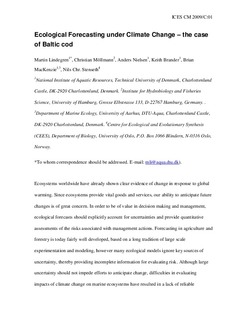| dc.description.abstract | Ecosystems worldwide have already shown clear evidence of change in response to global warming. Since ecosystems provide vital goods and services, our ability to anticipate future changes is of great concern. In order to be of value in decision making and management, ecological forecasts should explicitly account for uncertainties and provide quantitative assessments of the risks associated with management actions. Forecasting in agriculture and forestry is today fairly well developed, based on a long tradition of large scale experimentation and modeling, however many ecological models ignore key sources of uncertainty, thereby providing incomplete information for evaluating risk. Although large uncertainty should not impede efforts to anticipate change, difficulties in evaluating impacts of climate change on marine ecosystems have resulted in a lack of reliable
ICES CM 2009/C:01
forecasts for fisheries production. By adopting holistic ecosystem-based approaches, which consider both internal and external drivers, we can include many sources of uncertainty and provide quantitative risk assessments for future fisheries production under different climate and fisheries management scenarios. The methodology presented here assesses the combined impacts of climate and fishing on marine food-web dynamics and provides estimates of the confidence envelope of the forecasts. It is applied to cod (Gadus morhua) in the Baltic Sea, which is vulnerable to climate-related decline in salinity due to both direct and indirect effects (i.e. through species interactions) on early-life survival. A stochastic food web-model driven by regional climate scenarios is used to produce quantitative forecasts of cod dynamics in the 21st century. The forecasts show how exploitation would have to be adjusted in order to reduce risks of future stock collapse under different climate scenarios. Although specifically fitted to the Baltic Sea, a low-diversity ecosystem highly sensitive to climate change, the methodology presented here is flexible enough to be used for other ecosystems, drivers (environmental or anthropogenic) and uncertainties, given adequate time-series for the particular ecosystem. Adopting similar ecosystem-based approaches may provide a first step towards achieving long-term sustainability in marine fisheries worldwide.
Keywords: ecological forecasting, climate change, cod | no_NO |
